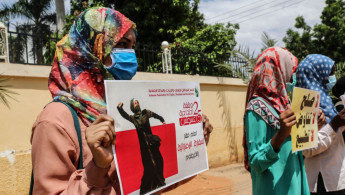Sudan delegation in UAE 'won't discuss Israel normalisation'
Sudan has denied that a delegation sent to meet US and Emirati officials in the Abu Dhabi on Monday will discuss normalising relations with Israel, despite many of the figures playing key roles in the recent UAE-Israel pact.
It comes after Ahmad Hadra, a member of the opposition Forces for Freedom and Change Coalition, alleged that the Sudanese delegation's mission was to normalise ties with Israel, after reports in media.
Since the UAE and Bahrain officially normalised ties with Israel this month, Sudan has been one of the countries named as most likely to follow suit.
A Sudanese minister on Tuesday denied this was the case.
"The ministerial delegation accompanying the chairman of the Sovereign Council, Abdel Fattah al-Burhan, is not mandated to discuss normalization with Israel," Information Minister Faisal Mohamed Saleh said, according to Anadolu Agency.
"This is the mission of an elected government," he said, referring to the transitional status of the current administration.
|
|
He insisted that the meeting is connected primarily with Khartoum's bid to have Sudan removed from Washington's list of state sponsors of terrorism, something that has seen the African state face sanctions and has discouraged international investment.
The high-level talks in Abu Dhabi will see leading Sudanese, US, and UAE officials meet, adding to suspicions that Israel normalisation will be on the cards.
It will include White House National Security Council's senior director for Gulf Affairs, Middle Eastern Affairs Directorate, Brig. Gen. Miguel Correa - one of the alleged architects of the UAE-Israel normalisation agreement, Axios reported.
Tahnoun bin Zayed, the UAE national security adviser tasked with Israel negotiations, will host the talks, while Prime Minister Abdalla Hamdok and Minister of Justice Nasredeen Abdulbari will represent Sudan.
Axios alleged that in return for recognising Israel, Sudan has demanded more than $3 billion in humanitarian assistance and direct budgetary aid.
Khartoum also wants a three-year commitment from the US and the UAE to provide economic aid.
Sudan has been under US sanctions for decades because of the presence of Islamists, including Osama bin Laden, who lived there for years in the 1990s before heading to Afghanistan.
Relations have improved under President Donald Trump, while a revolution last year overthrew former dictator Omar Al-Bashir.
There have been tensions since then between Sudan's powerful military generals and activists.





 Follow the Middle East's top stories in English at The New Arab on Google News
Follow the Middle East's top stories in English at The New Arab on Google News


